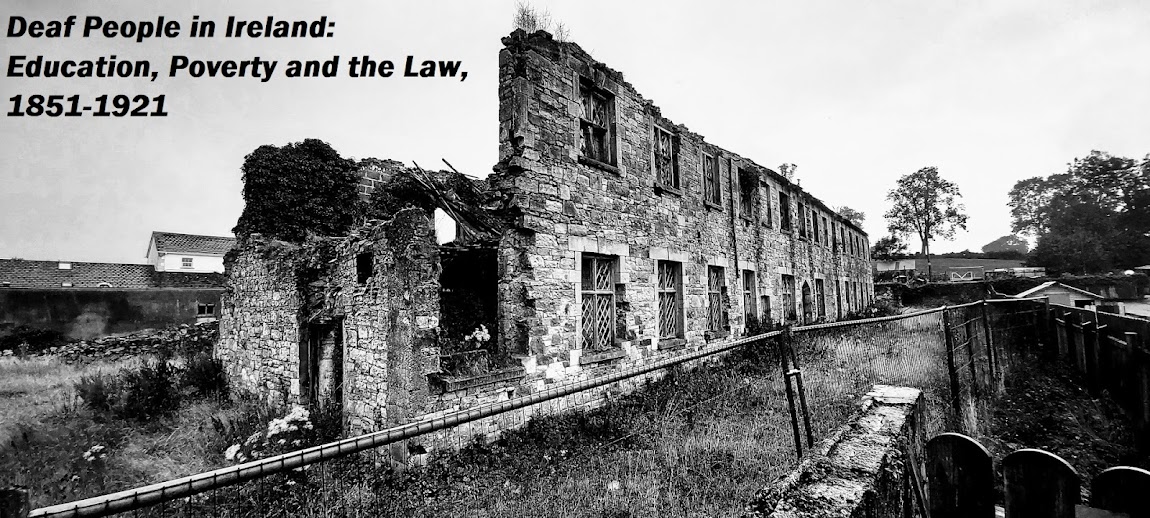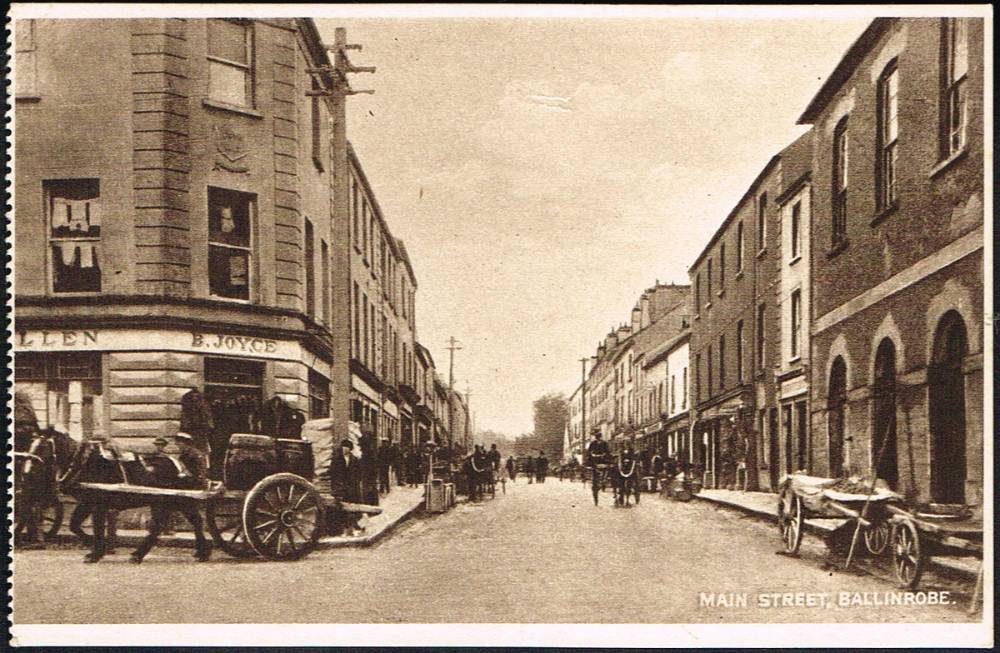I came across a curious story recently where a Deaf interpreter seems to be working in court. It’s an interesting one for many reasons. One reason is that happens in Ballinrobe, Co. Mayo - quite a bit away from the urban centres of Ireland. Another is that it shows that using different accounts in different newspapers, along with other records like the Census of Ireland, can help us form a more complete picture of the past, but still leave so many gaps that are impossible to fill in.
Martin Joyce was from Ballinrobe, and was sent to Cabra in 1868 by the local Ballinrobe Poor Law Guardians. He completed his education in Cabr after 6 years – at that time, that meant a complete term of education.
Not only was Martin a successful scholar, but on his leaving Cabra, he returned home to Ballinrobe - and personally thanked the guardians for the opportunity he had been given at education and learning a trade (in Martin’s case, shoemaking). He also brought references from St Joseph’s as to his good character; in fact they had given him a set of shoemaker’s tools when he left.
Martin doesn’t appear often in the court records of Ballinrobe, and even less so in the local newspapers. In 1879 he brought a hearing man, Michael Faraher, to court on a charge of assault. The newspapers reported that the locals wondered how communication was going to be possible in court. Ballinrobe at this time had the use of a county interpreter for Irish language court cases; was it he who would have to try and interpret? However, neither party appeared in the end when the case was called.
A good few years later in 1896, Martin again went to court seeking justice. It appeared that Martin had again accused another man – this time, Thomas Handcock – of assault, and the two men went to the local Ballinrobe Petty Sessions court. From two other newspaper articles I had found previously, it seems that Martin had handed in a written statement to the court detailing what had happened. Martin’s solicitor, named Kirwan, raised the point that according to a legal handbook used widely at the time – written by Constantine Molloy – an interpreter would be necessary for the hearing.
This is interesting in itself – the book does state this, but it isn’t raised very often at this time to persuade the court to provide an interpreter, and very infrequently indeed at Petty Sessions level. Apparently, it took some time to find someone ‘qualified’ (of course not meaning trained – just meaning ‘able to do the job’….) and they found someone – a man named Michael or Mike Kelly, from Ballinrobe, who attempted to speak for the court what Martin was signing.
Not much else is said about Mike Kelly. The details of the case are pretty mundane. There was disagreement about whether the assault actually happened, and in the end the case was dismissed after a ‘patient hearing’ by the magistrates. Recently, however, I came across a newspaper account of the same case, that revealed some interesting extra detail. The new article, in the Galway Observer, adds two facts. Firstly, that Michael Kelly’s interpretation wasn’t very clear to the court, but also that Kelly appeared to be deaf himself!
The article describes the interpreter as “nearly as deaf and dumb as himself [i.e.Martin]”. This isn’t mentioned at all in the other two newspaper articles. At one point, the Chairman of the court states that he could “understand more from the dummy than from the interpreter”. Obviously a pretty awful thing to read in the year 2023. The point here, though, is that Mike Kelly’s attempts to ‘speak’ for Martin weren’t very clear. The article also mentioned that Mike Kelly signed questions to Martin, but obviously, we have no way of knowing how good an interpreter he was – did he use ISL like Martin, or something else? The newspaper doesn’t say.
So who was Mike Kelly? Maybe he was able to hear and speak to the extent that he could function as an interpreter for Martin? It’s not clear in the newspaper articles whether Martin asked Mike to do this job for him or not. Perhaps some local people knew Mike was deaf and so he was sought out for the job.
Had Mike also gone to Cabra, and did he know ISL fluently? I had a look at the CIDD Reports and list of past pupils of St Joseph’s and can’t find a Mike or Michael Kelly from Ballinrobe. It’s doubtful he was a private pupil, as he doesn’t seem to have come from a wealthy family. He may have attended another Deaf school. In the 1901 and 1911 Census, there’s a Michael Kelly living in Glebe Street in Ballinrobe. In 1901, he lives with his mother Mary, but no mention is made on the Census form of Mike being deaf or any reference to hearing loss.
In 1911 Mike appears to be living on his own in the same house, his mother having passed away. In the 1911 Census form, however, two things caught my eye. Firstly, Mike is described as ‘dumb only’, and also, that he cannot read.
It’s important to understand that in both 1901 and 1911, the Census form was filled in by someone on Mike’s behalf – probably a policeman whose job it was to help illiterate people fill in their forms. Mike was described as ‘cannot read’ both years. It probably indicates that he never went to school at all, let alone a Deaf school, but even this we can’t be 100% sure about. The 1911 form mentioning that he was ‘dumb only’ is even more interesting. The Census forms allowed only certain options for this column – ‘deaf and dumb’ – or - ‘dumb only’. In practice, many people stated other things to try and capture their own self-perception of ability to speak, hear, etc. In this case, one policeman, when presented in 1901 with Mike Kelly, may have felt he was not ‘deaf and dumb’ or ‘dumb only’ either, but in 1911, a different policeman might have had a different impression. They might have considered Mike not quite ‘deaf and dumb’, as he possibly had some hearing and / or speech, but the options allowed by the form did not capture this; so he was described as ‘dumb only’.
So if this is the Mike Kelly who interpreted for Martin Joyce a few years earlier, it doesn’t appear to have been a fellow Cabra pupil. Did he sign? He must have had some ability to do so – or he wouldn’t have been called to interpret. So how did he come to learn sign language, and why?
I think the answer is interesting and appears a few months after the 1896 case. There was another court case that didn’t involve Martin or Mike at all, at least not directly. At the time there were strict laws about licensed premises and opening hours, and publicans would often appear in court if it seemed they had allowed people to drink after hours. In November 1896, a publican named Gaynor was in the Ballinrobe court accused of not allowing police in to check his pub late one night to check. The case doesn’t really interest us here, but there’s one really interesting bit where Gaynor talks about some of the local people who had been in the pub that night – and he mentions Martin Joyce and Mike Kelly having been in the pub the same night.
As for Martin himself, it isn’t clear whether his shoemaking business was successful in Ballinrobe after the court case. In 1901 it appears he was in Ballinrobe workhouse.
His fortunes changed somewhat by 1911. He was listed as one of four servants working for Patrick Murphy, a local shopkeeper.
He died in 1912 from cancer, back in the workhouse hospital.
A few years later in 1916, Mike Kelly also died, in the same workhouse hospital, again, of cancer.


















